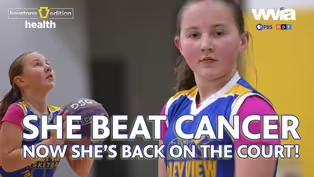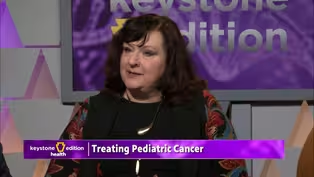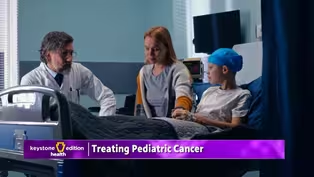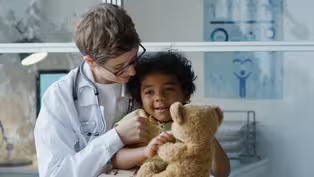Keystone Edition
Causes, Support Programs & Family Resilience
Clip: 2/17/2025 | 12m 45sVideo has Closed Captions
Experts discuss pediatric cancer causes, remission rates & family support.
Are childhood cancer rates rising? Experts discuss genetic vs. environmental causes, remission rates, and support programs like Camp Dost. Learn how ThinkBIG Pediatric Cancer Fund helps families with financial aid, FMLA guidance, and school reintegration. Hear personal stories of resilience and community support.
Problems playing video? | Closed Captioning Feedback
Problems playing video? | Closed Captioning Feedback
Keystone Edition is a local public television program presented by WVIA
Keystone Edition
Causes, Support Programs & Family Resilience
Clip: 2/17/2025 | 12m 45sVideo has Closed Captions
Are childhood cancer rates rising? Experts discuss genetic vs. environmental causes, remission rates, and support programs like Camp Dost. Learn how ThinkBIG Pediatric Cancer Fund helps families with financial aid, FMLA guidance, and school reintegration. Hear personal stories of resilience and community support.
Problems playing video? | Closed Captioning Feedback
How to Watch Keystone Edition
Keystone Edition is available to stream on pbs.org and the free PBS App, available on iPhone, Apple TV, Android TV, Android smartphones, Amazon Fire TV, Amazon Fire Tablet, Roku, Samsung Smart TV, and Vizio.
Providing Support for PBS.org
Learn Moreabout PBS online sponsorship- So Nate, I have a couple of questions based on what we just saw.
For starters, would you say that rates of cancer in children are increasing, decreasing, staying the same, and are most environmental or genetic?
- So over the last 50 years, it has increased, but primarily because of better detection.
As far as, I'm sorry, what was your second question?
- Whether it's environmental or genetic?
- So most of the time, it's a genetic mutation that occurs within the cancer cell.
It actually takes several mutations.
We don't really know of too many environmental causes of cancer.
There are some inherited causes, but there actually a rare, you know, cause for childhood cancer, usually it's just a random genetic mutation that occurs within usually a lymphocyte or a cell that's developing as the child is growing.
- And then they also mentioned that Addie's in remission, do most children stay in remission and what might be the percentage of kids who have occurrences?
- So almost 95% will go into what we call remission and about 30% will have recurrence.
And out of those 30%, we're still able to cure over half.
- Oh, that's positive.
I wanted to ask you Jessica about, stepping outside of the hospital for a second because Addie mentioned coaches versus cancer, which is a wonderful program, I'm just wondering if there's programs that you can recommend to the families.
For instance, I know the American Cancer Society also has a camp, but are there a lot of programs like that that kind of take the child outside of their problem and put them into a place where they feel like a normal child?
- Yeah, I think one of our more local programs is Camp Dost.
It's held in Millville, PA every summer, usually in July I believe.
And that allows for patients and siblings to come to an outdoor camp, do activities, outdoor games, ropes courses, swimming, and really just let them be a kid.
- And I wanna come back to your program for a second.
We've talked about the fact that you support families, but what specifically are you supporting them with and is there a dollar value that goes with that?
- Yeah, each family that qualifies for our program receives $5,000 in their calendar year.
So if they came to us in April, that's from April to April.
And, you know, through that, they submit their expenses.
We don't give the money to the family.
We pay their expenses for them.
So, you know, whenever that, and also too, should a child pass away, we will pay up to $5,000 for funeral expenses, so that, you know, the pressure is taken off as much as possible.
- And this is for any types of bills and expenses?
- Well, it's typical.
Usually, it's rent, car payments, insurances, utilities.
They're the most common ones.
Every once in a while, depending on the family's circumstances coming into the cancer, there are some, you know, things that are outside that circle that the committee will evaluate.
But for the most part, that's what we see.
- And when parents are thinking about how they're going to manage this next potential six months to three years, I think they're probably gonna have to consider family medical leave, PTO, et cetera.
Do you help them navigate these things and figure out what they are owed by their company and how to get extra help?
- Yeah, so part of my role is talking to them about the Family Medical Leave Act and I assist with any paperwork that they may come.
A lot of our families take what's called intermittent FMLA and it's all goes based on what their child's treatment journey is going to be.
A lot of them will do intermittent so that they can work when they can.
Now a lot of people have the option to work remotely.
So at our facility, we do have a lot of parents that will try to work from the hospital room if their child's admitted as much as they can.
And I've heard from some of our families that that really helps them kind of gain that normalcy that they are being able to take their mind off of it and focus on work for a little bit when able to.
- Yeah, I'd imagine that the distraction would be helpful.
Obviously, there's the physical toll on the child, but then I would imagine there's also the mental and emotional toll that's happening for the entire family.
Can you both speak a little bit to that, you from your perspective of helping families, and maybe Diane, you can speak to this from a personal perspective, if you don't mind?
- Sure.
- From my perspective, I mean, kids are so resilient.
And if there's one thing in my 10 years in this position that I have learned is sometimes it's harder on the parents than the child going through it.
I think Addie's dad said that so well in the video.
But the kids are really resilient and I think in my role, I appreciate being able to take some of those weights off with, hey, we can get you some help with paperwork from work or we can help coordinate with the school, whether that's home bound or cyber or we're just gonna take a break from school right now.
And then probably the biggest relief is knowing there's agencies like ThinkBIG that can really help because whether you're working or not, your income's reduced.
So you may not have the medical bills because your insurance coverage is there, but that doesn't stop your everyday bills from coming in.
- Right, right.
Well, when my granddaughter was ill, there's also the fact of their siblings oftentimes at home who cares for them, you know, how does their life go on?
And my other grandchildren at that time were homeschooled.
So the other grandma and I traded off.
She took care of the bulk of the homeschooling and I pretty much had them from Thursday to Monday.
Just, you know, cooking, cleaning the home, taking care of household things and trying to create some normalcy for them as well.
So I think that was my big role in that situation.
And just when I work with families, you know, sometimes they'll ask me, "How did you get started in ThinkBIG?"
And I have that little open door to share that I really do understand what you're going through because we were there as a family.
And, you know, I think that in some way when they know that somebody really does understand, it's helpful to them.
They feel, "I'm not in this alone."
And that's really one of I think the biggest part of ThinkBIG's mission is helping them feel cared for.
- And Nate, from your, obviously you're dealing with a lot of the physical repercussions of this diagnosis.
How do you find that children manage that?
And as a physician, how are you helping the parents manage?
- Well, children are resilient.
They really do bounce back very quickly.
Amazingly enough, you know, their growth seems to catch up after their treatment.
They tend to catch up in school for the most part because they're so, you know, so driven to get back to normal.
It's just truly amazing to watch these children go through this and how resilient and how amazing and how much they still want to have fun.
You know, make jokes, make fun of their doctors.
The parents, you know, as pediatric oncologists, we have two big jobs.
Get the child well and help the parents through it by explaining to them what's going on with their child, how they can help and what to look for.
And also to make sure that they are connected to all of the great resources that help them maintain at least as much normalcy as possible for themselves and their family to help the siblings, you know, not miss too much of their childhood.
And then, of course, you know, focusing on not just the treatment for the child, but helping the child cope with all of the things that they go through.
- Yeah, I can only imagine.
In terms of trying to maintain normalcy, we're trying to help families stay connected to their jobs and their kids.
You're trying to make sure that people are getting bills paid.
But once the kids go back to school, I'm just curious what that readjustment is like, if anyone can speak to that a little bit.
I don't know if kids may still have treatments that they have to have even though they've returned to school.
- Well, I'll start with the sort of the medical perspective.
There are times when going to school, you know, probably isn't safe or will result in more challenges than the child really needs at that time.
But we do try to get them back to school as soon as they can, even if they're still on treatment.
We want them to live, you know, as normal as a life as they can, but also continue on through school.
If we can get them to continue on to the next grade for example, then that's a success.
- Yeah, I think Addie was a prime example of that, saying that she has the basketball game, right?
You wanna get back to what's normal.
- And I think most schools that I've worked with are really accommodating.
I've helped families with recommendations for 504 plans that if, you know, the kid's in school and they need a little bit longer with assignments, they get that.
If they need to move their seat up to the front, they get that, or leave a little bit early to get to the next class on time.
The schools are really great as a support for our kids.
- Yeah, I know the school nurses definitely work really hard as do the guidance counselors and I didn't even think about the fact that you might have to connect with the school around a 504 plan or something of that sort.
Is there anything you'd like to add to that, Diane?
- I just think that, you know, for my family, the experience was one that even though it was probably the darkest time in our lives, we had so many people that gave us an outpouring of support.
There were people doing fundraisers, there were so many things going on in the community.
And, of course people, you know, our church was praying for us and people were caring.
And I mean, that just means more than, it's just not a word you say thank you.
It's really deep and heartfelt when, you know, you really almost depend on that.
So it was definitely present.
- Yeah, I'm glad you mentioned fundraisers because I definitely wanted to ask if people wanted to donate to ThinkBIG, how could they do so 'cause I'm sure you would love to be able to expand your services.
- Sure, well, we have a credit card portal right on our website, www.thinkbigpa.org.
And, you know, it's really simple, user friendly, and, you know, it really helps the families, you know.
They don't have to think about their electric bill, they don't have to think about, you know, the small incidentals and things, so every little bit helps.
- Yeah, and if you could, can you just tell us maybe one positive story that you've seen in your years of doing this work?
- I think one of my, oh gosh, I have so many favorite stories.
For me, it's seeing the kids come back after treatment, whether it's their one-year follow up, their two-year follow up, and just them being excited to come back.
They spend so much time with us, it becomes like another little family.
We get to know them, we get to know their siblings and uncles, cousins, grandparents.
And to see them come back and so many, like Diane just talked about giving back, so many of our patients give back.
And I think that is just what brings it all together.
And for me, it's being able to maybe link a family that went through it with a family who's just starting out with that journey.
And the networking piece of it I think is one of my favorite, favorite things just to see 'cause for me to say it as a social worker is fantastic, but when you hear it from somebody who's gone through it, it just means so much more.
- I appreciate you all sharing your insights.
Thank you to all of our guests for their insights and to all of you for joining us.
This and every episode of Keystone Edition
She Beat Cancer & Returned to the Game She Loves
Clip: 2/17/2025 | 3m 11s | At just six years old, Addie was diagnosed with cancer—but she never let it stop her. (3m 11s)
Supporting Families Through Pediatric Cancer: Early Diagnosis, Treatment, and Financial Aid
Video has Closed Captions
Clip: 2/17/2025 | 8m 40s | Experts discuss pediatric cancer, early diagnosis, and financial aid for families. (8m 40s)
Treating Pediatric Cancer - Overview
Clip: 2/17/2025 | 1m | Treating Pediatric Cancer - Overview (1m)
Treating Pediatric Cancer - Preview
Preview: 2/17/2025 | 30s | Watch Monday, February 17th at 7pm on WVIA TV (30s)
Providing Support for PBS.org
Learn Moreabout PBS online sponsorship
- News and Public Affairs

Top journalists deliver compelling original analysis of the hour's headlines.

- News and Public Affairs

FRONTLINE is investigative journalism that questions, explains and changes our world.












Support for PBS provided by:
Keystone Edition is a local public television program presented by WVIA



